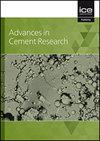Study on the effect of gypsum content in cement on the adaptability between cement and alkali-free accelerator at different temperatures
IF 1.3
4区 工程技术
Q3 CONSTRUCTION & BUILDING TECHNOLOGY
引用次数: 0
Abstract
The setting time and early strength of shotcrete is greatly affected by the gypsum content of cement. In this paper, setting time and compressive strength, and microscopic methods such as XRD quantitative analysis, thermogravimetric analysis and scanning electron microscope observation were used to determine the effects of changes in gypsum content on the hydration and mechanical properties of cement mixed with accelerator at different temperatures. The results showed that an increase in the gypsum content of cement promoted the formation of ettringite (AFt) and decreased the setting times of cement pastes at 0°C, 20°C and 40°C. Mortar compressive strength test revealed that after curing at 0°C, 20 °C and 40°C, the highest compressive strength was exhibited with final molar C3A/SO3 ratio of 0.84, 0.84 and 1.18, respectively. The mechanical properties of hardened cement pastes were adversely affected by C3A/SO3 ratios that were too high or too low. When the C3A/SO3 ratio was too high, which facilitated conversion of AFt to monosulphate(AFm) and slowed C3S hydration. Conversely, when the C3A/SO3 ratio was too low, which enabled large numbers of AFt to occupy the space where C-S-H gels was formed, resulting in decalcification of C-S-H gels.水泥中石膏含量对不同温度下水泥与无碱促进剂适应性的影响研究
喷射混凝土的凝结时间和早期强度受水泥中石膏含量的影响很大。本文采用凝结时间和抗压强度,以及 XRD 定量分析、热重分析和扫描电镜观察等微观方法,测定了石膏含量的变化对不同温度下掺加促进剂的水泥的水化和力学性能的影响。结果表明,水泥中石膏含量的增加会促进乙丁睛石(AFt)的形成,并缩短水泥浆在 0°C、20°C 和 40°C 时的凝结时间。砂浆抗压强度测试表明,在 0°C、20°C 和 40°C 下固化后,最终摩尔 C3A/SO3 比率分别为 0.84、0.84 和 1.18 时,抗压强度最高。C3A/SO3 比率过高或过低都会对硬化水泥浆的机械性能产生不利影响。当 C3A/SO3 比率过高时,会促进 AFt 转化为单硫酸盐(AFm),减缓 C3S 的水化。相反,当 C3A/SO3 比率过低时,大量 AFt 会占据 C-S-H 凝胶形成的空间,导致 C-S-H 凝胶脱钙。
本文章由计算机程序翻译,如有差异,请以英文原文为准。
求助全文
约1分钟内获得全文
求助全文
来源期刊

Advances in Cement Research
工程技术-材料科学:综合
CiteScore
3.70
自引率
5.00%
发文量
56
审稿时长
3.2 months
期刊介绍:
Advances in Cement Research highlights the scientific ideas and innovations within the cutting-edge cement manufacture industry. It is a global journal with a scope encompassing cement manufacture and materials, properties and durability of cementitious materials and systems, hydration, interaction of cement with other materials, analysis and testing, special cements and applications.
 求助内容:
求助内容: 应助结果提醒方式:
应助结果提醒方式:


